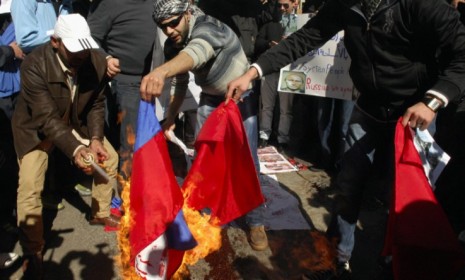Why Russia won't take a stand against Syria: 4 theories
Moscow and Beijing block a United Nations effort to condemn Syrian President Bashar al-Assad. What is Russia hoping to gain?

A free daily email with the biggest news stories of the day – and the best features from TheWeek.com
You are now subscribed
Your newsletter sign-up was successful
Just as Syria stepped up shelling on the rebel stronghold of Homs, Russia and China outraged the West over the weekend by vetoing a United Nations Security Council resolution condemning the regime of Syrian President Bashar al-Assad for its deadly crackdown on anti-government protesters. Russia and China called the proposal "unbalanced," arguing that it focused solely on Assad without targeting armed opposition groups. Moscow maintains that it wants to promote stability and democratic reform, and will dispatch Foreign Minister Sergei Lavrov to meet with Assad this week. Susan Rice, the U.S. ambassador to the U.N., says Russia is just trying to "shield a craven tyrant." Why is Moscow really standing in the way of the international effort to oust Assad? Here, four theories:
1. Syria is key to Russia's Middle East strategy
Moscow wants to hang onto its "sole major foothold in the Arab world," say William Maclean and Steve Gutterman at Reuters. Syria was a client of the Soviet Union, and Russian Prime Minister Vladimir Putin, who hopes to return to the presidency in March, wants to keep it in his orbit. With good reason, says Juan Cole at Informed Comment. Syria hosts Russia's only base on the Mediterranean. Without Syria, Russia can't counter the U.S. in the Middle East.
The Week
Escape your echo chamber. Get the facts behind the news, plus analysis from multiple perspectives.

Sign up for The Week's Free Newsletters
From our morning news briefing to a weekly Good News Newsletter, get the best of The Week delivered directly to your inbox.
From our morning news briefing to a weekly Good News Newsletter, get the best of The Week delivered directly to your inbox.
2. Syria spends a fortune on Russian weapons
"The fact that Russia still supplies arms to the Syrian security forces clearly weighed heavily on the vote," says David Dayen at Firedoglake. Syria is the largest importer of Russian weapons in the Middle East. Assad's regime has signed contracts for 24 MiG-29M/M2 fighter jets and eight Buk-M2E air-defense systems. Another deal for anti-ship defenses armed with supersonic cruise missiles is in the works. Russia doesn't want to lose this lucrative relationship.
3. Russia doesn't think it's the U.N.'s job to fix Syria
"Moscow fully accepts that Syria has serious internal problems," says Charles Crawford at Britain's Telegraph, "but takes the view that those problems are for Syrians themselves to sort out." Russia is willing to wait and see whether "the opposition forces lined up against Assad are tough enough to do what it takes — including incurring casualties on a massive scale, tens of thousands of casualties more than anything seen so far — to overthrow him without sneaky Western direct military support, as was given in Libya."
A free daily email with the biggest news stories of the day – and the best features from TheWeek.com
4. Russia fears another Libya
Russia and China "had their fingers burned" by failing to block last year's resolution on Libya, says Cole at Informed Comment, only to see the U.N.-authorized no-fly zone transformed into an instrument of regime change. They don't want to see that happen again. But the Libya solution probably wouldn't work in Syria, anyway, says Doug Mataconis at Outside the Beltway. "The Syrians don't seem to be using air power against civilians and rebelling military elements the way the Libyans did." This is urban warfare, which is far harder to fight from the air, and "I seriously doubt that there's any nation on Earth that would be willing to send ground troops into Syria at this point."
-
 The ‘ravenous’ demand for Cornish minerals
The ‘ravenous’ demand for Cornish mineralsUnder the Radar Growing need for critical minerals to power tech has intensified ‘appetite’ for lithium, which could be a ‘huge boon’ for local economy
-
 Why are election experts taking Trump’s midterm threats seriously?
Why are election experts taking Trump’s midterm threats seriously?IN THE SPOTLIGHT As the president muses about polling place deployments and a centralized electoral system aimed at one-party control, lawmakers are taking this administration at its word
-
 ‘Restaurateurs have become millionaires’
‘Restaurateurs have become millionaires’Instant Opinion Opinion, comment and editorials of the day